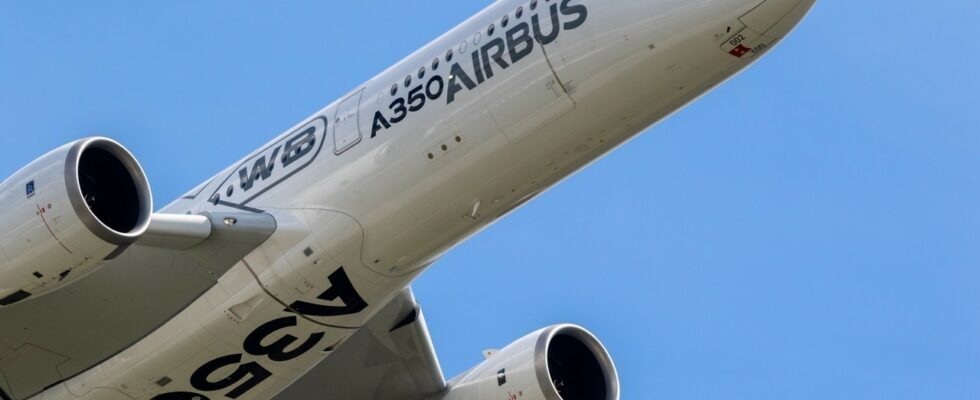(BFM Bourse) – The Canadian bank raised its advice on the aeronautical group this Tuesday to “outperformance”, judging that Airbus can still take market share from Boeing.
Airbus is clearly in the news this Tuesday. The aeronautics and defense group has decided not to buy the BDS (cybersecurity, big data and supercomputers) division of Atos. This new strategic shift – Airbus had already considered taking a minority stake in BDS last year before changing its mind – hardly penalizes the action.
The Airbus share rose 1.9% around 12:30 p.m. and signed the largest increase in the CAC 40. The BDS buyback may have been perceived negatively by investors because, as Jefferies wrote, this transaction could be done to the detriment of buybacks of actions and have more political than industrial justifications.
But Airbus stock is probably also driven by Royal Bank of Canada. Coincidentally with the calendar, the Canadian bank raised its opinion to “outperform” on the stock this Tuesday, the equivalent of buying from the establishment, while raising its price target to 192 euros against 145 euros previously. This new target gives a potential of almost 20% (18%) to Monday’s closing price.
>> Access our exclusive graphic analyses, and gain insight into the Trading Portfolio
A market share that could consolidate
Airbus is already operating at its all-time highs on the stock market at the moment, propelled by aircraft deliveries which have largely exceeded its expectations, the group having delivered 735 aircraft in 2023 against a target of 720 units. Remember that payment for an aircraft essentially occurs when the aircraft is duly received by its customer.
According to Royal Bank of Canada, Airbus shares also benefited from the 2024 outlook “initially well received by investors” and from execution problems at its great American rival Boeing, which continues to suffer from technical problems with its 737 Max. Especially since a cap holder came loose during a flight with the American company Alaska Airlines.
However, the Canadian bank considers that Airbus still has potential on the stock market, in particular because the European group should strengthen its advantage over Boeing in single-aisle aircraft. “Leadership is a powerful competitive advantage in aerospace markets,” explains the establishment.
According to Royal Bank of Canada, Airbus currently has 61% of the single-aisle market and has delivered 3,200 A320 neos, 1,700 more planes than Boeing’s competing 737 Max family. And by the end of 2026, the bank estimates that the gap will widen to 2,200 planes between the two families. “Given Airbus’ growing order book and manufacturing quality issues at Boeing, we believe Airbus is poised to take further market share,” the bank concludes.
The health of Airbus’ supply chain “remains a determining factor in increasing production rates on single-aisle aircraft, but we believe this situation is stable,” writes Royal Bank of Canada. “We believe that several high-profile campaigns will be important for market confidence, and that another year of strong A320 sales should be a positive catalyst,” the bank added.
Significant cash generation
The establishment believes that Airbus will be able to significantly increase the pace of deliveries. The Canadian bank judges that Airbus should be able to deliver 815 planes in 2024 (compared to a target of 800 for Airbus) and 930 in 2025.
Royal Bank of Canada is all the more confident that the technical problems with the GTF – an engine developed by its supplier Pratt&Whitney and which equips roughly 45% of A320 neos in flight – do not seem to have any significant repercussions. Due to defective metal powder, Raytheon, parent company of Pratt & Whitney, announced in September that it would have to inspect hundreds of aircraft in service until 2026.
“Approximately 550 aircraft with GTF engines are currently grounded, and the program still faces substantial risk. However, we believe Airbus has successfully transferred much of this risk to the aftermarket , and we do not consider the GTF to be a significant risk to Airbus’ delivery schedule in 2024,” explains Royal Bank of Canada.
This delivery trajectory as well as a favorable pricing environment on single-aisle aircraft will also result in higher margins and better cash generation.
Royal Bank of Canada expects an adjusted operating margin of nearly 10% (9.9%) in 2025. The group would then match the record profitability of 2019. This point is important because the Canadian bank writes that Airbus has, with American investors, the reputation of missing its medium-term objectives. The group had indicated at the end of 2022 that it would return to its peak adjusted operating margin once it had reached 1,000 deliveries. Royal Bank of Canada therefore judges that the group will regain this profitability without needing to deliver 1,000 devices, which should support market confidence in it.
As for cash, the Canadian bank anticipates a free cash flow of 4.2 billion euros in 2024 and 6.2 billion in 2025 (after 3.9 billion in 2023).
Ultimately, with this robust cash generation over the coming years, Airbus would display an impressive net cash position of 16 billion euros at the end of 2025 (20 euros per share, the bank calculates), in the establishment’s model. This war chest would offer “options” to the group for its capital allocation, explains Royal Bank of Canada. The bank implies that the group would have the means to make acquisitions, to return more cash to its shareholders, or to accelerate its investments, in particular to finance a new plane.
Julien Marion – ©2024 BFM Bourse
Are you following this action?
Receive all the information on AIRBUS GROUP in real time:
